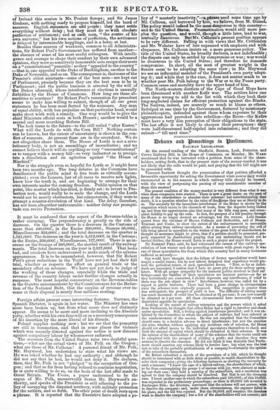Foreign affairs present some interesting features. Narvaez, the Spanish Dictator,
is again in hot water. The Ministry has once more been broken up, but from what cause does not distinctly appear. He seems to be more and more inclining to the Absolute party, whether with his own free-will or as a necessary consequence of his desertion by the more liberal of his friends.
Poland supplies nothing new ; but we see that the peasantry are still in commotion and that in some places the violence which was recently directed against the nobles is now directed against compulsory labour by whomsoever enforced. The accounts from the United States raise two doubtful ques- tions,—what are the actual views of Mr. Polk on the Oregon ; what are those of Mr. Calhoun? A personal friend of Mr. Polk, Mr. Heywood, has undertaken to state what his views are. Be was asked whether he had any authority ; and although he did not say that he had, he would not deny it. He declares, then, that Mr. Polk in not " pledged " to the occupation of Ore- gon ; and that so far from having refused to continue negotiation, he is quite willing to do so, on the basis of the last offer made tO Great Britain. The Union, a paper understood to be the organ of Mr. Polk, unreservedly denies Mr. Heywood's au- thority, and speaks of the President as still adhering to the po- licy of occupying the disputed territory, with military protection for the settlers, and so forth. The other point of doubt rests upon a phrase. It is reported that the Executive have adopted a po- licy of "masterly inactivity,"—a phrase used some time ago by Mr. Calhoun, and borrowed by him, we believe, from M. Guizot. The policy would indeed be the most dangerous to this country— and to the United States. Procrastination would still more per- plex the question, and would, though a little later, lead to war, mutually disastrous. Butlir. Calhoun's present position appears to be very different. Falling in with views that Mr. Crittenden and Mr. Webster have of late expressed with emphasis and with eloquence, Mr. Calhoun insists on a more generous policy. The title of the United States, he broadly declares, is not mdefeasible; the dispute can only be settled by compromise or war ; war would be disastrous to the United States; and therefore he demands compromise. In short, all the men of reatest weight in the Senate seem' to be adopting the same view ; in Mr. Heywood we see an influential member of the President's own party adopt- ing it ; and while that is the case, it does not matter much to us whether poor Mr. Polk belong to the War or to the Peace party. Common sense and morality have the upper hand of him.
The North-western districts of the Cape of Good Hope have been threatened with another Kafir war. The settlers have one more deep wrong to add to the list with which they back their long-neglected claims for efficient protection against the Blacks. The Natives, indeed, are scarcely so much to blame as others. Indulged at one time by the Government, flattered by missionary philanthropists, defended against those whom exposure to their aggressions had provoked into rebellion—the Boers—the Kafir& must have a very dim perception of their obligations to the state. The last affair is not likely to sharpen their perceptions : tte3r were half-threatened half-cajoled into submission; and they did submit—" till next time."


























 Previous page
Previous page